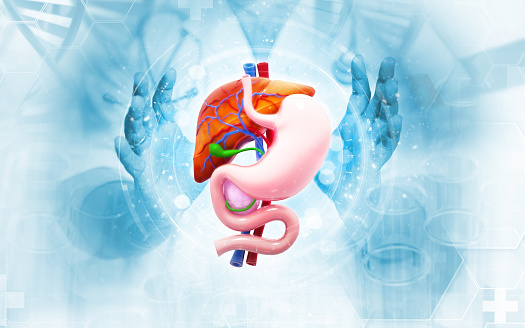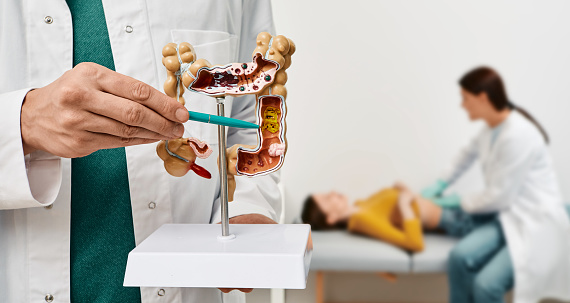Do you know what a gastroenterologist is? You may have heard the term before. A gastroenterologist is a medical professional who focuses on conditions of the gastrointestinal (GI) tract, which includes the digestive system. The esophagus, stomach, small intestine, colon, rectum, pancreas, gallbladder, bile ducts, and liver are among the conditions that gastroenterologists diagnose and treat.
As experts on how food affects your overall well-being and health, they can help patients with ailments related to nutrition issues or those suffering from chronic digestive conditions such as Crohn's Disease or Irritable Bowel Syndrome (IBS). Read on to learn more about this important specialty field of medicine.
Gastroenterology

The medical speciality of gastroenterology is dedicated to the diagnosis and treatment of conditions affecting the digestive system. Disorders of the esophagus, stomach, intestines, liver, gallbladder, pancreas, and bile ducts are included in this. Additionally, it addresses nutrition-related problems like obesity and malnutrition.
A gastroenterologist performs diagnostic tests such as upper endoscopy and colonoscopy to diagnose disease and determine necessary treatments. Gastroenterologists are also skilled in performing certain surgical procedures when needed.
Who Might Need To See A Gastroenterologist?

If you experience any discomfort or pain in your abdomen or have chronic digestive problems such as constipation or diarrhea, it might be helpful to see a gastroenterologist. If you have any of the following symptoms, it might be worth consulting a gastroenterologist:
- Acid reflux or heartburn
- Bloating and gas
- Nausea or vomiting
- Abdominal pain or discomfort
- Blood in your stool
- Unexplained weight loss
Gastroenterologists can also help patients with conditions like Irritable Bowel Syndrome, Celiac Disease, Crohn's Disease, and Ulcerative Colitis. They are uniquely qualified to provide nutritional advice for those suffering from digestive issues or malnutrition. Understanding how food affects your overall health and well-being can help you make the best dietary decisions for your condition.
If you're experiencing any of the above symptoms or have a chronic digestive disorder, it's best to consult with a gastroenterologist for proper diagnosis and treatment. With their expertise in this field, they can help you find the right solution for your needs.
Common Medical Conditions Related by Gastroenterologists
Gastroenterologists diagnose and treat a range of common digestive conditions, including:
- Gastroesophageal reflux disease (GERD)
- Irritable bowel syndrome (IBS)
- Crohn’s disease
- Ulcerative colitis
- Celiac disease
- Gallstones
- Hepatitis A, B, and C
- Pancreatitis.
Additionally, they can help with issues such as difficulty swallowing, persistent abdominal pain or bloating, and nutrition problems. They can also perform endoscopies and colonoscopies when needed for diagnosis or treatment.
Diagnostic Tests Used by Gastroenterologists
Gastroenterologists use a variety of tests to diagnose and treat digestive conditions, including:
- Upper endoscopy – Examines the esophagus, stomach, and part of the small intestine.
- Colonoscopy – Examines the entire large bowel.
- Endoscopic ultrasound (EUS) – Uses sound waves to look at deeper layers of the GI tract wall and nearby organs such as the pancreas or liver.
- Capsule endoscopy – A pill with a tiny camera is swallowed that takes pictures inside your digestive system while it travels through it.
- Stool sample tests – Analyzes samples for toxins, parasites, or other abnormal substances in the intestines.
- Breath testing – Measures levels of hydrogen and carbon dioxide in the breath to detect problems with digestion.
- Blood tests – Check for infection, inflammation, or other bodily abnormalities.
If you experience any digestive issues, seeing a gastroenterologist for proper diagnosis and treatment is important. With their specialized knowledge and sophisticated tools, they can help diagnose and treat complex digestive conditions properly.
Furthermore, they are an invaluable source of insight and advice when it comes to nutrition-related issues as well. So don't hesitate to contact a gastroenterologist if you have a digestive problem requiring attention. They can help get you back on track to enjoy optimal health again.
Benefits of Seeing a Gastroenterologist Regularly
- Early diagnosis and treatment of digestive issues: Gastroenterologists are highly experienced in diagnosing and treating various digestive health issues, from common conditions like acid reflux to more serious ones like Crohn’s Disease. Catching problems early on can help you manage your condition better with fewer complications.
- Improved nutrition: Eating well is essential for good digestive health, but it can be hard to know the right choices if you have a chronic condition. Gastroenterologists can provide tailored nutrition advice to your needs, helping you make healthier food choices that benefit your digestion and overall well-being.
- Reduced risk of colon cancer: Regularly seeing a gastroenterologist increases your chances of catching colon cancer in its early stages, reducing the risk of it developing into something more serious.
- Reduced risk of infection: Gastroenterologists are specialists in detecting and treating stomach viruses or bacterial infections that can cause digestive symptoms. Early diagnosis allows for earlier treatment, reducing symptoms' severity and duration.
- Improved quality of life: Chronic digestive issues such as Crohn’s Disease, IBS, or GERD can have a major impact on daily life, making it difficult to work, complete everyday tasks and enjoy time with family and friends. A good gastroenterologist can advise you on how best to manage your condition so that you can lead a happier and healthier life.
- Comprehensive care: Gastroenterologists often collaborate with other specialists to ensure that the patient has a comprehensive treatment plan that addresses their digestive needs and any other medical conditions they may have.
- Access to new treatments and procedures: A good gastroenterologist will stay up-to-date on the latest treatments and advances in medical technology so that they can provide access to cutting-edge therapies not available elsewhere. This can be invaluable if you suffer from a rare or complex condition.
- Prevention: As well as providing treatment options, a gastroenterologist can also help with preventative measures to reduce the risk of digestive issues occurring in the future. This could involve lifestyle changes such as quitting smoking or tools such as endoscopy screenings which detect early signs of problems before they become more serious.
Seeing a gastroenterologist regularly is an important part of maintaining good digestive health. A qualified and experienced specialist can provide a comprehensive care plan that includes diagnosis, treatment, and prevention for any digestive issue you may have. Don’t hesitate to contact one if you suspect something is wrong – earlier detection and treatment can make all the difference regarding your well-being.
FAQS
What is the difference between a gastrologist and a gastroenterologist?
A gastroenterologist is a medical doctor who specializes in diagnosing and treating digestive conditions, from acid reflux to Crohn’s Disease. A gastrologist is a medical professional with specialized training in diagnosing and treating digestive diseases, but they are not necessarily a physician.
Does a gastroenterologist do surgery?
Yes, some gastroenterologists are trained in performing procedures such as endoscopies and colonoscopies, while others may specialize in various surgeries related to the digestive system. It is best to speak with your physician to determine which type of specialist you need.
What is gastrointestinal surgery called?
Gastrointestinal surgery is also known as GI (gastrointestinal) or abdominal surgery. It includes operations on the stomach, intestines, colon, rectum, bile ducts, and other digestive organs. GI surgeons may perform procedures such as hernia repair, gallbladder removal, and cancer resection.
Conclusion
A gastroenterologist is a specialist who focuses on the digestive tract and diagnosing and treating any related medical issues. They are highly trained medical professionals who seek to provide high-quality care for individuals suffering from gastrointestinal disorders. A gastroenterologist can help improve the quality of life by treating the underlying cause of a patient’s digestive discomfort and providing relief.

Ways to Get Rid of Bloating
Apr 30, 2023

What Is a Zero-Carb Diet
Apr 25, 2023

Lean Protein Foods
Apr 25, 2023

Benefits of Wormwood
Jul 30, 2023

Foods That Are High in Vitamin D
Apr 26, 2023

Winning the Battle Against Laryngitis: Natural Remedies that Work
Aug 03, 2023

Best Foods That Are High In Zinc
Apr 18, 2023

What Is the A-Positive Blood Type Diet
Apr 30, 2023



